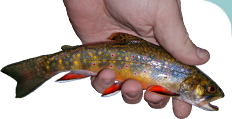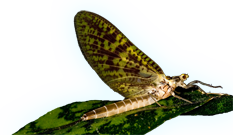Blog & Latest Updates
Fly Fishing Articles
Insects by Common Name


> > 2 insect wing vein questions, and 1 on etymology
| Dickybird | August 18th, 2021, 6:49 pm | |
| Posts: 7 | I tried these on Jason, who suggested I pass them on to the forum: 1) Does anybody know of a published work that shows mayfly and/or caddisfly vein pattern details by family? 2) Mayflies. It seems that the shape, extent and veining of the costal cell (between C and Sc) in the hindwing may be characteristic. For example, in Paraleptophlebia, not only is there no real costal projection, but the hindwing C and Sc remain well separated all the way to the apex, defining an unusually long and rather uniformly wide costal cell. It is well laddered by crossveins. This is similar to what you see in Hexagenia, but quite different from the Heptageniidae, where this cell appears to pinch off just above the costal point. However, what I can’t tell from the (Troutnut and other) pictures is whether I might be fooling myself in this last detail. It is possible that what looks to me to be a pinching off of the cell is just the costal cell twisting down out of the plane of the picture. Is the apparent pinching off real for Heptageniidae? What about Ephemera simulans. I would have thought that that would be the same as Hexagenia limbata, which has a very clear, well laddered costal cell extending all the way to the hindwing apex, but in the pictures I have seen for E. simulans, Sc seems to approach C very closely or completely somewhat above the costal angle, but then may separate again closer to the apex. This apparent feature might also be the result of twisting. 3) Does anyone know what “genia” means in hexagenia and heptagenia? Genia (or gena) should relate to birth or origin or genitalia, but none of these makes sense. | |
| Taxon | August 18th, 2021, 9:50 pm | |
Site Editor Royse City, TXPosts: 1350 | Hi Rich- Although I customarily religiously avoid promoting my website while responding to questions here, I am going to make an exception in this case. My consolidated illustration index is a list of all the illustrations of various aquatic insects (and other macroinvertebrates) contained within the books in my rather extensive aquatic entomology library. Many of these books don't even contain an index of their own illustrations. The consolidated illustration index is simply an attempt to bring order and efficiency to the process of searching for aquatic insect illustrations. If you don't have ready access to the actual reference book, this index may be of limited value. However, at least you will know which book contains the desired illustrations when you visit a flyshop, bookstore, or library. My consolidated illustration index can be accessed through the link below. | |
| Best regards, Roger Rohrbeck www.FlyfishingEntomology.com | ||
| Dickybird | August 19th, 2021, 3:25 pm | |
| Posts: 7 | Hi Roger Thanks for your response. I had previously visited your site, but not really picked up on the resources there. Very good. Regarding your recommended books: As it happens, someone just gave me a copy of McCafferty, but I hadn't looked at it. Extraordinary drawings, and some relevant to my question 1. Jason suggested Merritt, et al. The two Leonards sounds very good as well. I sent off for copies of the last two. Best, Rich | |
| Taxon | August 19th, 2021, 9:11 pm | |
Site Editor Royse City, TXPosts: 1350 | Sure; my pleasure. | |
| Best regards, Roger Rohrbeck www.FlyfishingEntomology.com | ||
| Konchu | August 25th, 2021, 7:40 am | |
Site Editor IndianaPosts: 505 | 3) On the genus names question, Benjamin Walsh named several mayfly genera in a paper published in 1863. These include Pentagenia (the fifth genus), Hexagenia (the sixth genus), and Heptagenia (the seventh genus). Rather simple, but I've always found that bit of trivia funny for some reason. | |
| Dickybird | August 27th, 2021, 6:56 pm | |
| Posts: 7 | Hi Konchu, Thanks for the answer. I find it rather a let down, rather than funny, but still... I suppose we have to be happy that Walsh didn't report on 17,000 bugs. Do you happen to have a reference to the paper, or perhaps even a copy? Rich | |
| Konchu | August 30th, 2021, 1:27 pm | |
Site Editor IndianaPosts: 505 | http://www.ephemeroptera-galactica.com/pubs/pub_w/pubwalshb1863p167.pdf | |
| Dickybird | September 1st, 2021, 6:59 pm | |
| Posts: 7 | Hi Konchu, Great. Thanks. R | |
| Troutnut | September 7th, 2021, 4:23 pm | |
Administrator Bellevue, WAPosts: 2737 | Although I customarily religiously avoid promoting my website while responding to questions here, I am going to make an exception in this case. Roger, there's no need to avoid promoting your website here. By all means link to it whenever you think it might be helpful to anyone. I'm generally fine with people linking to their own external content as long as it's on-topic and they're productive members of the forum in other ways; you very clearly meet those conditions! These include Pentagenia (the fifth genus), Hexagenia (the sixth genus), and Heptagenia (the seventh genus). I didn't know that -- hilarious! | |
| Jason Neuswanger, Ph.D. Troutnut and salmonid ecologist | ||
Quick Reply
You have to be logged in to post on the forum. It's this easy:
Related Discussions
| Title | Replies | Last Reply |
| Re: Mayfly Identification In the Identify This! Board by Calloway | 9 | Mar 13, 2009 by Martinlf |
| Re: From Hook-up to Hand In General Discussion by GONZO | 21 | Jul 20, 2007 by Shawnny3 |
| Re: One more In the Identify This! Board by Taju | 7 | Nov 18, 2008 by Taju |
| Re: re - a couple bugs........ In the Photography Board by Creno | 7 | May 12, 2008 by GONZO |
| Re: Possible Didymo in the East Branch of the Delaware In by Softhackle | 12 | Jul 15, 2015 by AFISHN |
| Re: This is not Ephemera simulans In Hexagenia limbata Mayfly Nymph by Beardius | 1 | Aug 2, 2008 by Troutnut |
| Re: October Ephemerellid In the Identify This! Board by Crepuscular | 15 | Oct 22, 2013 by Entoman |
| Re: Stumped! In Ephemerella needhami Mayfly Dun by GONZO | 8 | Dec 5, 2008 by Beardius |
| Re: Heptageniidae? In the Identify This! Board by Willmilne | 5 | May 19, 2009 by GONZO |
| Re: Tiny Baetid In General Discussion by Crepuscular | 21 | Oct 11, 2014 by TroutBums |
Troutnut.com is copyright © 2004-2024 Jason
Neuswanger (email Jason). See my FAQ for information about use of my images.
 privacy policy
privacy policy



